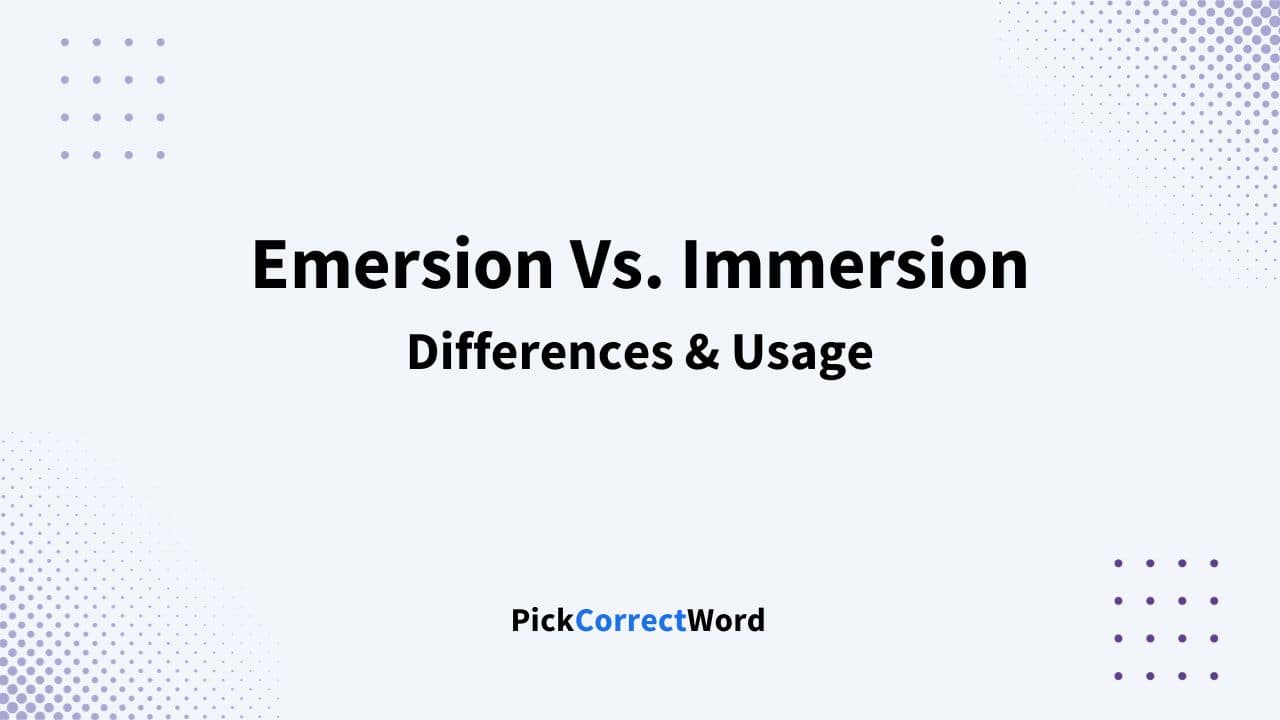When you come across the terms emersion and immersion, you might be curious about the difference between them.
Emersion describes a process where something emerges or comes out of a particular situation. For example, when a swimmer surfaces for air after being underwater, that’s emersion.
On the other hand, immersion is when something gets fully submerged or deeply involved in a situation or medium, like a cloth being soaked in water.
This is very important to know: neither of the terms is wrong or misleading. They’re just used in different situations and mean different things.
Emersion vs Immersion? What’s the Difference?
The primary difference between emersion and immersion lies in their meanings and applications related to coming out of (emersion) or submerging oneself (immersion) into a situation or substance. Let’s look into more details about each term.
Emersion: Meaning and usage
Emersion refers to the act of emerging or coming out of a state or situation.
It is commonly used in situations such as an individual resurfacing from underwater or a problem being resolved. Here’s a simple example to help you understand:
- Imagine you are swimming underwater and suddenly emerge to the surface, gasping for air. That act of coming out of the water is an example of emersion.
Immersion: Meaning and usage
Immersion is the state of being fully engaged or absorbed in something, often by submerging into it, like a liquid. Here’s an example to clarify this term:
- When you dive into a swimming pool, you are immersed in the water, completely surrounded and engulfed by it.
Examples of using Emersion in a sentence
“After holding his breath for a minute, his emersion from the pool was met with cheers.“
“The emersion of the seedlings from the soil signaled the start of spring.“
“We awaited the emersion of the moon from behind the clouds to continue our night hike.“
“The turtle’s emersion from its shell was slow but deliberate.“
“As the crisis began to resolve, the company saw the emersion of new growth opportunities.“
“The emersion of the sun after the solar eclipse was a breathtaking sight.“
“She described her emersion from depression as a reawakening to life.“
“The submarine’s emersion was carefully timed to avoid detection.“
“The emersion of the whales from the water was an impressive display.“
“After years of isolation, his emersion into society was a significant challenge.“
Examples of using Immersion in a sentence
“The artist’s immersion in her painting lasted hours, oblivious to the world around her.“
“During the science experiment, the immersion of the metal in acid was carefully monitored.“
“His immersion in video games made him lose track of time.“
“The children’s immersion in the story was evident by their wide-eyed silence.“
“For the marinade to work, you need complete immersion of the chicken in the sauce.“
“The documentary provided an immersion into the lives of deep-sea creatures.“
“The immersion of the cloth in dye gave it a vibrant blue color.“
“She experienced full cultural immersion during her year abroad in Italy.“
“In the immersion method of language teaching, students only speak the target language.“
“The eclipse began with the immersion of the moon’s edge behind the Earth’s shadow.“
Emersion Vs. Immersion: US Vs UK English
In both UK and US English, “emersion” and “immersion” share the same meanings, spellings, and ways of use. There’s hardly any difference in how these two words are spelled or used in American and British English.
You can tweak the spelling slightly and switch between “emersion” and “immersion” in both versions of English without causing any confusion.
Keep in mind that no matter the English dialect, both words keep their original meanings and uses.
To sum it up, emersion and immersion illustrate opposite actions of coming out of and submerging oneself into a substance or situation. By understanding their distinct meanings and usage, you can confidently differentiate between these two terms in various situations


